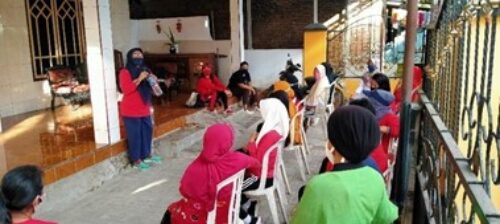Women Leading the Waste Bank Movement in Gowa District, Indonesia

In most Indonesian homes, women are responsible for nearly all household chores, including managing waste, but in South Sulawesi’s Gowa District, women are taking steps towards greater gender equality in their homes, while training their community to manage household waste. These changes are supported by Transformasi, a grantee of USAID’s Municipal Waste Recycling Program (MWRP) and its local partner, the non-governmental organization Yayasan Peduli Negeri (YPN). Based in neighboring Makassar City, YPN has a long track record of implementing community-based solid waste management and recycling programs and currently leads the organization of waste banks (bank sampah) in Gowa District. Transformasi and YPN helped to form 45 new waste banks and link them with the recently established Gowa central waste bank, a government facility that collects recyclable materials from the waste banks and guarantees them a fair price.
Waste banks are run by community members who collect and sort recyclable household waste and earn income by reselling it. This also prevents plastic waste from polluting the environment or ending up in the ocean. In Gowa, approximately 85 percent of the members are women, many from lower income households. Supported by YPN organizers and the local Islamic community association, Anisah Rahmawani, a housewife in Somba Opu Subdistrict, used her training in business management skills to mobilize women in her neighborhood to become active in the newly formed waste bank. Motivated by a concern for the environment, she was also driven to find ways for unemployed housewives to supplement household income. Once the bank sampah was on sound footing, she helped establish six more in the surrounding neighborhoods.
In the beginning, the husbands of the women involved with the waste bank were against what were perceived to be unsavory, menial tasks. Undeterred, Anisah urged her colleagues to stay committed, and continue segregating their own household waste, and sell the recyclable waste. “Let the men learn by seeing our action,” Anisah said. Husbands are expected to be the family breadwinner and involved in productive work outside the home, whereas women typically are responsible for domestic work. Working in waste collection outside the homes may be seen as a “disturbance” to the normal division of labor. However, Anisah’s persistence paid off, and – over time – the husbands began to see the economic advantages and the environmental benefits of a cleaner community.
Using the income earned from their activities , the waste bank members can more easily afford to buy staple foods for their family or to assist poorer neighbors. Husbands are showing their support by getting more involved in housework, segregating waste, and helping to maintain the physical infrastructure. This exposure to a more equal distribution of waste management responsibilities at home will likely influence how children see household gender roles. Following the example set by the women waste bank activists, community residents have gradually reshaped their traditional gender attitudes towards cleaning and household waste segregation.
Since the beginning of the program, Gowa District’s waste banks have sent approximately 17,850 kg of sorted inorganic waste to recycling centers. The COVID-19 pandemic has undeniably led to more single-use plastic consumption and impacted the waste management program in the community. However, Transformasi and the Gowa government have remained committed to forming more waste banks while ensuring that existing operations continue to grow and become more sustainable.
Fore more details, see the factsheet on Transformasi’s work in South Sulawesi.

